Features
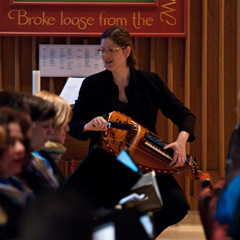 Jesuit Fr. Gilles Mongeau has been cultivating an occassional community of artists who gather once or twice a year for an artists' liturgy. On the feast of St. Joseph, March 26, the artists' liturgy took the form of morning prayer from the Divine Office.
Jesuit Fr. Gilles Mongeau has been cultivating an occassional community of artists who gather once or twice a year for an artists' liturgy. On the feast of St. Joseph, March 26, the artists' liturgy took the form of morning prayer from the Divine Office.
The singers contributing to this liturgy, and singing as you view these photographs, are the 46-member Cantores Celestes.
The amatuer women's choir has been singing together for 22 years, and over those years has raised more than $30,000 for charity. Singing for a liturgy rather than a concert allows the choir to connect with its repertoire of religious music in a very different way, said conductor Kelly Galbraith.
...
View the images in the slideshow that is embedded below or click here to load a larger version in a new window.
Use the small icon, ![]() , in the bottom right corner of the player to view the slideshow in full-screen mode.
, in the bottom right corner of the player to view the slideshow in full-screen mode.
Will real issues be up for election debate?
By Michael Swan, The Catholic Register It’s hard to know what will be decided in the May 2 election, but it’s just as hard to imagine that Canadians will decide well unless we inject respect, sincerity, honesty and a few high-minded ideals into our political culture.
It’s hard to know what will be decided in the May 2 election, but it’s just as hard to imagine that Canadians will decide well unless we inject respect, sincerity, honesty and a few high-minded ideals into our political culture.
We can’t run a country on vitriolic rhetoric, political tactics and cheap-shot ads, said Christian think-tank director Peter Stockland. Looking at the latest attack ads turned Stockland’s stomach.
“I was absolutely appalled that a government and a lot of people in that government would unleash something like that,” said the director of the Cardus Centre for Cultural Renewal. “Where’s the charity?”
The Conservative ads claim Liberal leader Michael Ignatieff is dangerously soft on crime, and a Liberal government would make people unsafe in their homes and neighbourhoods.
St. Jerome’s, union reach settlement
By Catholic Register Staff St. Jerome’s University took two steps toward peace between professors and administrators March 24 as a first contract between the faculty’s union and the university and a plan to set up a senate-like body to oversee academic matters by May 2012 were ratified by the university’s board of governors.
St. Jerome’s University took two steps toward peace between professors and administrators March 24 as a first contract between the faculty’s union and the university and a plan to set up a senate-like body to oversee academic matters by May 2012 were ratified by the university’s board of governors.The union contract will see St. Jerome’s faculty keep pace with colleagues at the University of Waterloo in terms of salary and benefits. St. Jerome’s is the Catholic college federated with the University of Waterloo.
It was how the school is governed, rather than money, that inspired the professors and librarians to seek union protection. But in the end, governance issues were not part of union negotiations.
A separate working group with representatives from the board of governors, administration and academic staff was struck to report on possible reforms to how St. Jerome’s runs itself.
Nukes or no nukes: a moral dilemma
By Michael Swan, The Catholic Register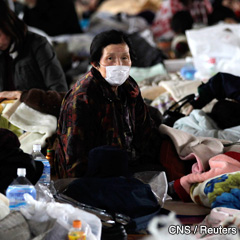 Who would want to choose between the morality of indecision and fear versus the morality of blind, reckless gambles imposed on future generations? Whether we want it or not, the nuclear question awaits.
Who would want to choose between the morality of indecision and fear versus the morality of blind, reckless gambles imposed on future generations? Whether we want it or not, the nuclear question awaits.
Canada’s Nuclear Safety Commission began three weeks of hearings March 21 at Hope Fellowship Church in Courtice, Ont., on future plans for the Darlington Nuclear Station near Bowmanville, Ont., about 50 km east of Toronto. There are plans for four new nuclear reactors at the station on the shores of Lake Ontario.
Hundreds of written submissions were already before the nuclear regulator before the world was riveted to its television screens, watching Japan’s Fukushima 50 (in fact, about 200 technicians and engineers) fight to keep their crippled nuclear power plant from killing hundreds of thousands of people in the aftermath of the devastating earthquake and tsunamis that struck Japan March 11.
Nukes or no nukes: the moral dilemma
By Michael Swan, The Catholic Register Who would want to choose between the morality of indecision and fear versus the morality of blind, reckless gambles imposed on future generations? Whether we want it or not, the nuclear question awaits.
Who would want to choose between the morality of indecision and fear versus the morality of blind, reckless gambles imposed on future generations? Whether we want it or not, the nuclear question awaits.
Canada’s Nuclear Safety Commission began three weeks of hearings March 21 at Hope Fellowship Church in Courtice, Ont., on future plans for the Darlington Nuclear Station near Bowmanville, Ont., about 50 km east of Toronto. There are plans for four new nuclear reactors at the station on the shores of Lake Ontario.
Hundreds of written submissions were already before the nuclear regulator before the world was riveted to its television screens, watching Japan’s Fukushima 50 (in fact, about 200 technicians and engineers) fight to keep their crippled nuclear power plant from killing hundreds of thousands of people in the aftermath of the devastating earthquake and tsunamis that struck Japan March 11.
TCDSB to reschedule equity policy symposium
By Sheila Dabu Nonato, The Catholic Register TORONTO - The Toronto Catholic District School Board has cancelled its upcoming symposium on the province’s equity policy, which was set to begin on March 26, with some hinting that it was because of a controversial keynote speaker.
TORONTO - The Toronto Catholic District School Board has cancelled its upcoming symposium on the province’s equity policy, which was set to begin on March 26, with some hinting that it was because of a controversial keynote speaker.Board chair Ann Andrachuk denied that was the case, saying the cancellation was “an issue with aligning panelists” and that it would be rescheduled.
“Everybody’s got other commitments,” she said.
But trustee John del Grande, in a March 23 newsletter to constituents, said that in addition to the scheduling conflict of panelists, some parents had raised concerns about a speaker, Chris D’Souza, a course director at the York University Faculty of Education. D’Souza is also a former equity and diversity officer with the Dufferin Peel Catholic District School Board.
Celebrating Fr. Troy’s unconventional ways
By Vanessa Santilli-Raimondo, The Catholic Register TORONTO - Spiritan Father Michael Troy, founding father and principal at Toronto’s Neil McNeil High School, had an untraditional way of thinking, said Fr. Gerald FitzGerald.
TORONTO - Spiritan Father Michael Troy, founding father and principal at Toronto’s Neil McNeil High School, had an untraditional way of thinking, said Fr. Gerald FitzGerald.“There was a rapport, a relationship and a casualness between the priest-teachers and the boys that did not exist elsewhere and that was the unique spirit of Neil McNeil,” said FitzGerald, a fellow Spiritan who was a seminarian under Troy in Dublin and a science teacher at Neil McNeil. “He came in at a unique time in the spread of Catholic education — and I think he left a stamp on it.
“I think he shook up Catholic education,” said FitzGerald. “He came here with no preconceived ideas and he brought with him a tremendous freshness.”
Catholic groups have concerns over full-day kindergarten
By Sheila Dabu Nonato, The Catholic Register TORONTO - While Ontario’s full-day kindergarten program is in high demand and considered by several Catholic education groups an “investment” in the future, there remain concerns.
TORONTO - While Ontario’s full-day kindergarten program is in high demand and considered by several Catholic education groups an “investment” in the future, there remain concerns.The provincial government introduced the full-day kindergarten program in September 2010 at about 600 schools across the province. By September 2012, there will be close to triple that number of schools offering the program.
Among the issues that need to be worked out are funding and after-school care, according to some Catholic groups. Dan Barrett, president of the Toronto Association of Parents in Catholic Education, says once the full-day kindergarten classes end for the day, making an arrangement for care afterwards can be “problematic.”
‘Monastic chic’ is always in for religious
By Sheila Dabu Nonato, The Catholic Register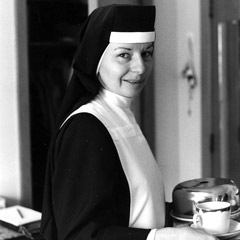 TORONTO - Religious garb is in, says Forbes magazine. The churchly trend was quite evident at one of the world’s premier fashion events, New York Fashion Week, where models paraded outfits topped with hoods reminiscent of the cloister. The twist was that designers added leather jackets, dresses and catsuits to create a look that Forbes dubbed “monastic chic.”
TORONTO - Religious garb is in, says Forbes magazine. The churchly trend was quite evident at one of the world’s premier fashion events, New York Fashion Week, where models paraded outfits topped with hoods reminiscent of the cloister. The twist was that designers added leather jackets, dresses and catsuits to create a look that Forbes dubbed “monastic chic.”The cloister would seem an unlikely source of inspiration for the world’s top fashion designers in our increasingly secular society. After all, for nuns, it’s not fashion that motivates them to wear a habit. Religious garb is a symbol of their identity and commitment to serve God and the Church.
It may suddenly be all the rage in chic fashion circles, but for nuns such as Sr. Agnes Roger the habit was never out of fashion. She continues to debunk myths about the habit and the religious communities that continue to wear them, including the claim that the habit is a throwback to another age.
Rising food prices threaten health of poor
By Michael Swan, The Catholic Register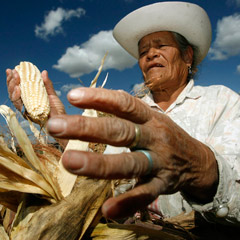 Money that the Catholic agency Chalice used to spend helping kids go to school, helping adults acquire basic literacy, helping communities organize around income-producing projects is now going to feed people who can no longer afford rice and beans.
Money that the Catholic agency Chalice used to spend helping kids go to school, helping adults acquire basic literacy, helping communities organize around income-producing projects is now going to feed people who can no longer afford rice and beans.Commodity food prices, particularly for wheat and rice, have risen to their highest levels since 2008. The World Bank’s food price index shot up 15 per cent between October and January. The bank estimates price increases have driven another 44 million into extreme poverty.
“The impact in the beginning was initially a reduction in the quantity of food being served (at parish-run feeding programs). Now it’s transitioned into a change in diet,” said Suzanne Johnson, Chalice’s international manager for Africa, Haiti and Ukraine. “With rice being so expensive and wheat, they’re now pretty much based on cassava and maize... Our feeding programs are trying to deal with the same amount of money, but the dollar is not buying as much.”
New tool to help pick Catholic education
By Deborah Gyapong, Canadian Catholic News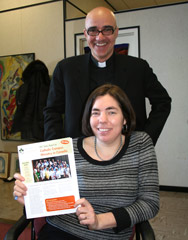 OTTAWA - Canadian Catholic Campus Ministry (CCCM) has devised a tool to help guide students in choosing a university where there` can keep their faith alive.
OTTAWA - Canadian Catholic Campus Ministry (CCCM) has devised a tool to help guide students in choosing a university where there` can keep their faith alive.The tool can help students find a school where there is a “vibrant, active student ministry” that will help “nurture their faith” and allow them to “blossom,” said CCCM co-ordinator Lori Neale.
The 2011 Status Report on Catholic Campus Ministry in Canada is the first of a series of status reports on the state of campus ministry across Canada. Neale said CCCM will track the information by doing a similar study in another two or three years.

